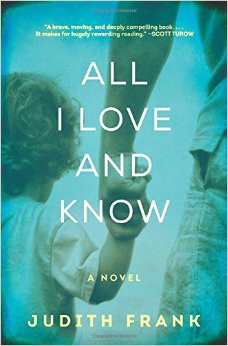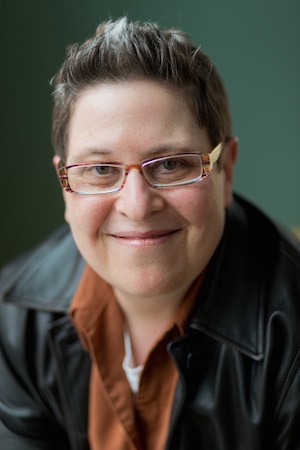A (Spoiler-Free) Interview With All I Love and Know Author Judith Frank

Judith Frank teaches English at Amherst College and is the author of All I Love and Know, now out with Harper Collins. We talked recently.
So. I should disclose that I was a student of yours at Amherst–and, let’s be honest, your favorite. Moving on! Now. Did you sit down and say, “I’m going to write a book about a gay couple, who raise the children of one of the men’s identical twin brothers in the Pioneer Valley, after that brother and his wife are killed in a terrorist bombing in Israel during the second Intifada?” and that’s what happened? Or did it grow out of another idea?
I started with the twin brother and his wife being killed in a terrorist bombing (my twin sister in Israel loves this). Then I thought about how to challenge the gay brother and his partner to the max, and decided to bring two grieving children into the mix.
Once I had the premise, it didn’t change–I just had to decide where to go from there. And I was aware that starting a novel with a terrorist attack was going to be challenging, because in terms of building a plot, where on earth do you go from there?
Your identical twin sister has been a good sport about your story?
She has been extremely good natured from the start about my killing off the twin. It helps that it’s fiction, and it helps that these characters are men. But it’s super-generous on her part, and it’s touching how much she loves this book.
So once I started reading this book it was difficult to put down. The writing is so good but it’s also, and I mean this in the best way, it is also at its heart a kind of traditional romance, and a bit of a soap opera. Story-wise, how much it was mapped out and how much did you sort of let happen?
There is a lot of story. Kirkus called it “first-rate commercial fiction,” which was a bit of a dagger in my literary heart. My agent, editor, and partner all had to give me lectures deconstructing the literary/commercial binary.
I write plot through the characters. I ask: given this challenge, how would the character respond or act out? I knew on which historical day I wanted the novel to end, but even then, I didn’t know what was going to happen on that day.
Without giving a lot away, where were some points where you got stuck?
I feel like I always get stuck about two-thirds of the way through the first draft. I went back and read the journals I was writing when I was at that point in my first novel, Crybaby Butch, and they’re full of despair. I think that’s all I can say without giving plot away.
Was there an epiphany or just a slog?
In the book, Daniel’s grief makes him cold and rigid, and he withdraws from Matt. I needed Matt to do something drastic, in his need for contact. What I came up with was a huge a-ha moment–one I’m still thrilled about, one that pulls together several of the novel’s threads in a really surprising way–but I can’t provide any other detail because it’d be a huge spoiler.
I know that your mother died recently. Was she able to read the book before she died?
My mom read two drafts of the book. We had a complicated relationship, but she loved my work. There was one thing she thought should be changed, and of course I scoffed at that–but not only went on to change it, but was a big enough person to admit that to her. She was thrilled, mostly because it proved to her that her mind was still sharp at that stage when her health was bad.
I miss her. She would’ve been calling me daily to update me on things people said about the book.
My mother was not an easy person, but you could never underestimate her. In her mid-70s she joined a reconstructionist shul with a radical rabbi, and went with him and a delegation to Palestine, where she did home stays in refugee camps. It was totally transformative for her, and I admire that. She actually said, on local public radio, that when one people is occupied by another, there are no longer two sides to the story. Meaning that all the justifications the occupying country musters about its need for its own security become irrelevant in the face of its oppression of others.

That’s very interesting, and conveniently leads to my next question–what were the challenges in representing gay men, and representing Israel?
Both complicated! I decided to write about gay men rather than lesbians both for commercial reasons and just because that’s where my imagination took me. I didn’t feel that inventing those characters was that hard, but I did consult with my native informants about things like what music gay men were listening to in 2003. And about the sex scenes as well–one was unproblematic and didn’t change much, but one difficult scene late in the book took a lot of discussion with several gay friends and their friends.
As for Israel: I wanted to explore what it would be like for someone who has lost a loved one in a terrorist attack, if the dominant narrative he was getting from his culture–retaliation, “war on terror,” the idea that Palestinians are less human than Israelis–actually made him feel a lot worse, rather than better.
I know you lived in Israel for many years, so for the portion of the book that takes place there you had experience. As for the relative dying in a terrorist bombing, what sort of research did you do around that?
I made two trips to Israel, staying with my sister’s family. She’s a social worker, and she hooked me up with social workers who help victims’ families–from the scene of the blast, to the morgue, to long term care. I talked with one social worker at the Jerusalem municipality for over an hour, and I couldn’t believe how generous she was with her time and her emotional energy: she described every single little aspect of that experience, down to what the morgue smells like.
And I read a lot, and I watched Israeli documentaries about survivors’ groups. There’s a scene where Daniel goes to a talk at Smith–and the people in it are based on people in a real group, the Families Forum, which is a group of Israelis and Palestinians who have lost family members to terror. I’ve seen films they’ve made about their work; they’re amazing people.
Which characters were really easy for you, and which were more challenging?
Matt was the easiest. He’s the goyische boyfriend–calls himself “the goyfriend”–and he battles with anxieties that he’s immature and selfish. He thinks all the selfish thoughts you’d think if your partner was suddenly sunk into hell. Daniel was the hardest. He’s grieving as the novel opens and still grieving as it closes, although differently. I wanted to write as close to the bone as I could about mourning, and it was hard to do that without risking alienating readers. Because he gets kind of rigid and frozen. It was Daniel, and his process, that required the most rewrites.
I know you had kids somewhere in this process–which must have been hard, it terms of time, but also good for getting that part of the book right.
My kids are turning six next month. They were born midway through writing. A few years into their lives, when I was despairing about time and energy, I went to a reading by Paul Harding, who said that he’d written Tinkers in the car as he drove around his colicky baby. Every time he was able to stop for a second, he’d write until she started crying again. He’s my hero.
I didn’t change a lot, but I added a little texture. It took me eight years to write this book. That’s not just because of the kids, it’s because I’m slow and because I have a demanding job. It got written mostly during summers and sabbaticals. I was at MacDowell for two glorious weeks, and now, the main thing helping me contemplate starting another novel is the prospect of going back there.
I am interested in the food there. Please discuss.
I found the famous picnic basket lunches a little heavy. The dinners were sublime. The men were all crushed out on the very pregnant chef.
But not you?
There was no way for me to even get near her, given all the lounging about in the kitchen by foodie men.
I know your wife Liz was your first reader. Did she say the stuff you wanted her to say?
I need readers very early on, when the writing is still terrible–otherwise the process is just too lonely. And she reads the early stuff and apparently still loves me. She also holds the big ambitions for me; she’s certain that what I’m writing is important.
As for drawing on that relationship in the novel, I’m Jewish and Liz is not: I took every very minor tension we might have had over the years about Israel and cranked up the volume on them. One of the things that I like about Matt and Daniel’s fights is that they basically have the same beliefs, and still, they’re fighting about them.
Final questions: pretty weird that this book came out at this time, with renewed hostilities between Israel and the Palestinians.
Yes. I’m having trouble handling the clash between my misery over that situation and my joy about the release of this book.
Sarah Miller is the author Inside the Mind of Gideon Rayburn and The Other Girl. She lives in Nevada City, CA. Follow her on Twitter @sarahlovescali.